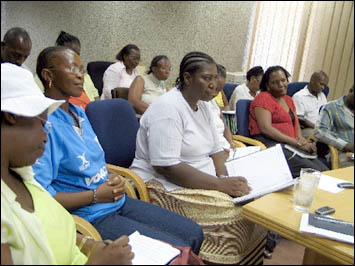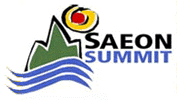Johan's monthly comment
For students' eyes only
 |
Research students can join for free, have their projects permanently advertised, discuss their issues, and scout for study and career opportunities. This is a first for South African science as far as we know (please correct this statement if we're wrong …).
The GSN constituency brings together a broad spectrum of disciplines and students working in different ecosystems, from oceans to rivers, beaches to mountains, pedosphere to atmosphere and wilds to cities.
Students are rapidly signing up and this momentum has been accelerated by the GSN workshop following the SAEON Summit. The GSN has been initiated and steered by students themselves and is attracting both full-time and part-time students up to post-doctoral level.
"Research students can join for free, have their projects permanently advertised, discuss their issues, and scout for study and career opportunities."
Science education going places
 |
|
Science educators are
eager to attend the SAEON Ndlovu Node's Teachers' Tearoom Forums which
give them the opportunity to discuss their issues, develop hands-on
environmental monitoring projects for their learners, and interact with
research scientists and academics.
|
Another exciting innovation is the Teachers' Tearoom Forum that has been launched in Phalaborwa by the Ndlovu Node's environmental science outreach officer, Joe Sibiya.
Can you imagine the typical, relatively remote bushveld town and its surrounding townships having regular meetings of science educators discussing their issues, developing hands-on environmental monitoring projects for their learners and interacting with research scientists and academics? In spite of meetings being held after hours attendance has been good.
As the educators develop their own capacity to teach science, they will progressively enthuse and equip thousands of learners over years to come. Karen Ostlund of the University of Texas says that teaching science process enhances reading, writing and oral communication skills and, not surprisingly, mathematical ability and logical thinking.
Keep an eye open for that steady stream of budding scientists that will hail from Phalaborwa and surrounds. Why not avail yourself of the opportunity to interact freely and effortlessly with a community of rural schools and take your research interests places? If you're interested, be sure to contact Joe at joe@saeon.ac.za.
"Why not avail yourself of the opportunity to interact freely and effortlessly with a community of rural schools and take your research interests places?"
A simmering SAEON Summit
 |
This was an event for SAEON’s potential data providers and users alike and was a meeting of minds from Higher Education, Science Councils, Government, Industry as well as independent consultants. The keen interest shown by South African Journal of Science to publish the papers testifies to the timeliness and importance of the Summit.
"The keen interest shown by South African Journal of Science to publish the papers testifies to the timeliness and importance of the Summit."










